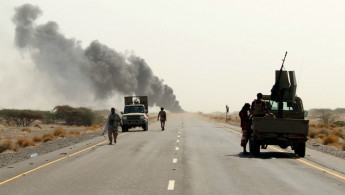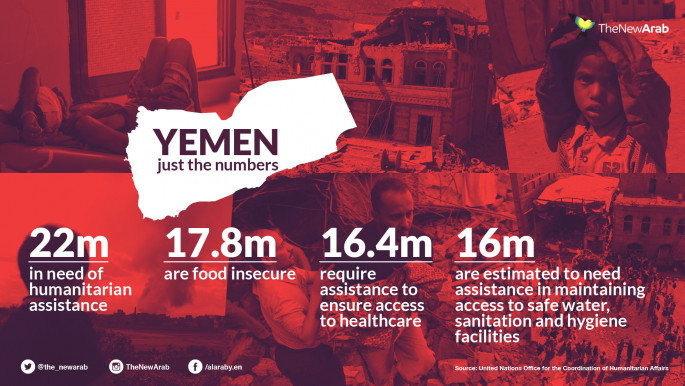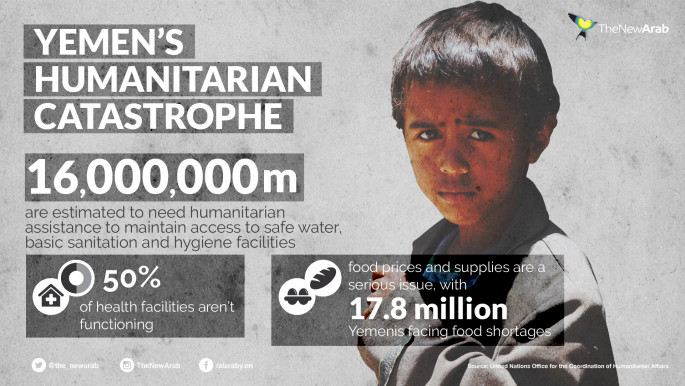'It's getting worse': Thousands flee from Saudi-backed offensive in Yemen's Hodeidah
 |
Clashes along Yemen's western coast have displaced around 100,000 people in recent months, most of them from Hodeidah Governorate |  |
"It is a glimpse of what potentially lies in store on a wider scale if the fighting encroaches on the densely populated port city of Hodeidah."
Amnesty International interviewed 34 civilians who had arrived in the southern city of Aden after clashes displaced them from Hodeidah province between January and early May.
As both sides engaged in fierce clashes, an assortment of munitions, bullets and shrapnel ripped through civilian homes, and Saudi Arabia-led coalition air strikes also killed and injured civilians.
"Every day people would die, every day we would see ripped bodies around us, blown to smithereens. Can we stay there? We had to leave to escape alive. We couldn't live in such danger," Hassan, a 26-year-old displaced fisherman from Qataba village in al-Khawkhah, told Amnesty.
'We would surely die'
Although fleeing the violent clashes was the only option for many to survive, the journey to safety was often deadly.
Buses carrying civilians were blown up by landmines and other devices allegedly planted by Houthi rebels in a bid to stop government forces from advancing. Civilians said they saw severed body parts litter the route.
The trauma of the journey had a severe psychological impact of fleeing civilians. One woman told Amnesty that she had a miscarriage as soon as she arrived in Aden, which she attributed to the fear and exhaustion caused by the journey.
"All the way from when we left and until we arrived we were screaming and crying. We saw dead bodies and we saw others ripped to pieces," a 25-year-old woman from Qataba told Amnesty.
"We left not thinking we would survive. We thought we would surely die… [but] by the end of it we hoped we died instead of going through what we went through."
 |
As both sides engaged in fierce clashes, an assortment of munitions, bullets and shrapnel ripped through civilian homes |
 |
Fleeing the fighting also took a heavy financial toll for families already living under precarious economic conditions.
Some families paid to leave on private buses and trucks, forking out around 10,000 Riyals ($30) per person, a small fortune in war torn Yemen.
Most funded the trip by selling wedding rings, property deeds and livestock.
Some of the displaced have travelled to more secure parts of Hodeidah governorate, while others have fled to Aden, eastward to Hadramawt, and even to Mahra on the far side of the country.
In the absence of formal camps for internally displaced persons (IDPs), many of the displaced civilians interviewed by Amnesty International in Aden have sought makeshift shelter in precarious settings, including buildings under construction or crumbling structures that were badly damaged in fighting
"It was very clear interviewing displaced civilians that they were escaping in sheer terror, some had been displaced for several months but you could see how shaken they were," Amnesty's Rawya Rageh told The New Arab.
'It only got worse'
Several people told Amnesty that they had attempted to leave Hodeidah province up to three times before succeeding, with Houthi rebels forcing civilians to stay and turning back buses.
Some waited for several months in hopes the clashes would subside, but eventually decided to leave in late April or early May.
"We were hoping the war would end, but it only got worse. The bombardment became heavier. It became so random," one woman said.
As battle lines continuously shift, civilians are caught up in fighting between Houthis and government forces wherever they go.
Saudi air strikes in Zabid, south of Hodeidah port, killed three civilians in January, while Houthi mortar fire, notoriously imprecise, has killed civilians during fighting in built-up urban areas.
"The picture we are gathering from civilians is that they are caught up in air and ground attacks, while infrastructure and civilians were deliberately targeted by mortar attacks, airstrikes, and landmines," Rageh told TNA.
"The most vulnerable among the civilian population are bearing the brunt of this new offensive in Yemen's war," Rageh said.
"All sides must abide by international humanitarian law, including taking all feasible precautions to minimize civilian casualties and the destruction of homes and civilian infrastructure."





